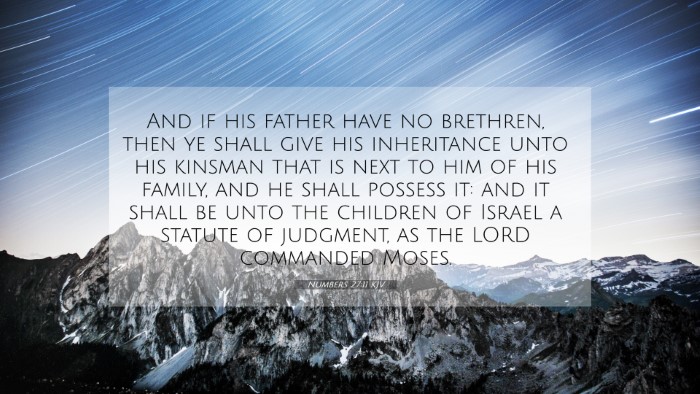Understanding Numbers 27:11
Bible Verse: Numbers 27:11 - "And if his father has no brothers, then you shall give his inheritance to his nearest relative, and he shall possess it; and it shall be to the children of Israel a statute of judgment, as the Lord commanded Moses."
Summary of Insights
This verse speaks of the laws surrounding inheritance in the context of the Israelites. It emphasizes God's concern for justice, equity, and the welfare of families within the community. The provision for inheritance serves not only as a practical measure but also as a reflection of God's overarching principles of order and fairness.
Commentary Insights
Matthew Henry
Matthew Henry emphasizes that this verse reflects God's wisdom in establishing a clear and just system for inheritance. A man's possessions are not merely personal but have communal importance, ensuring that families and their legacies are sustained. Henry remarks that this statute protects the rights of the vulnerable and maintains order among the tribes.
Albert Barnes
Albert Barnes provides a detailed analysis of the implications of inheritance laws. He notes that the instructions given here reveal a divine order that prioritizes the distribution of assets to the nearest of kin, reinforcing family ties. Barnes also highlights the necessity for justice in the land to prevent disputes and foster harmony among the tribes.
Adam Clarke
Adam Clarke elaborates on the significance of the phrase "nearest relative," suggesting that it points to a caring community that looks out for one another. He remarks on the importance of this law in ensuring that the memory and rights of the deceased are honored, providing support and stability for those left behind.
Related Bible Cross References
- Leviticus 25:25 - This verse discusses the redemption of land by the nearest relative, showing a similar concern for family heritage.
- Deuteronomy 25:5-10 - Details about levirate marriage and family preservation, underscoring the theme of marital and familial responsibilities.
- Joshua 17:4 - The daughters of Zelophehad received inheritance, illustrating the principle of justice and fairness in distribution.
- Proverbs 13:22 - “A good man leaves an inheritance to his children's children,” highlighting the importance of leaving a legacy.
- Matthew 5:17 - Jesus fulfills the Law, connecting the inheritance laws to greater spiritual truths of God’s covenantal promises.
- James 1:27 - Reflects on caring for orphans and widows, which relates to the equity and justice principles seen in Numbers 27:11.
- Romans 8:17 - Discusses being heirs with Christ, connecting earthly inheritance to spiritual promises.
Thematic Connections
This verse is part of a broader theme in the Pentateuch that deals with inheritance and family. Understanding Numbers 27:11 aids in comprehending related themes of justice, community, and divine order highlighted throughout the Scriptures.
Conclusion
Numbers 27:11 serves not only as a legalistic decree but also as a rich expression of God's care for His people and their relationships. It reminds us of the importance of community, justice, and the sanctity of family ties in the moral and social structure that God commands.
Tools for Further Study
For anyone looking to delve deeper into the connections and implications of this verse, consider utilizing:
- Bible concordance - Locate terms and relevant verses quickly.
- Bible cross-reference guide - For mapping interconnections among various scriptures.
- Cross-reference Bible study - Engage with multiple texts to better understand contextual meanings.
- Comprehensive Bible cross-reference materials - Explore extensive commentaries to enrich your understanding.
Exploring Inter-Biblical Dialogue
By engaging in cross-referencing Bible study methods, one can discover:
- Identifying connections between Old and New Testament.
- Comparative study of Pauline epistles.
- Links between the Prophets and Apostolic teachings.
- Interpretation of thematic elements through cross-references.
Final Thoughts
Understanding Numbers 27:11 within its context and through cross-references enriches our grasp of biblical law and its implications for modern faith and life.








